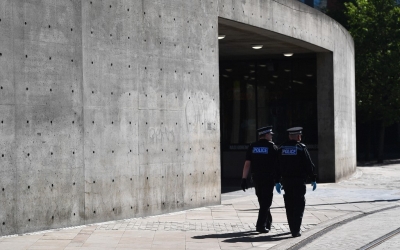UK Prevent strategy: Priti Patel extends deadline for long-delayed review

A long-delayed review of the UK government’s contentious Prevent counter-terrorism strategy is set to miss another deadline for completion.
The review, which was announced by the Home Office in January 2019, was due to be published by the end of 2021.
But Middle East Eye understands that Home Secretary Priti Patel has agreed to a request from William Shawcross, the reviewer whose own appointment has also been a matter of controversy, for an extension into the new year.
What is the Prevent Strategy?
+ Show - HidePrevent is a programme within the British government's counter-terrorism strategy that aims to “safeguard and support those vulnerable to radicalisation, to stop them from becoming terrorists or supporting terrorism”.
It was publicly launched in the aftermath of the 2005 London bombings and was initially targeted squarely at Muslim communities, prompting continuing complaints of discrimination and concerns that the programme was being used to collect intelligence.
In 2011, Prevent's remit was expanded to cover all forms of extremism, defined by the government as “vocal or active opposition to fundamental British values, including democracy, the rule of law, individual liberty and mutual respect and tolerance of different faiths and beliefs.”
In 2015, the government introduced the Prevent Duty which requires public sector workers including doctors, teachers and even nursery staff to have “due regard to the need to prevent people being drawn into terrorism”.
A key element of Prevent is Channel, a programme that offers mentoring and support to people assessed to be at risk of becoming terrorists. Prevent referrals of some young children have proved contentious. 114 children under the age of 15 received Channel support in 2017/18.
Criticism of the Prevent Duty includes that it has had a “chilling effect” on free speech in classrooms and universities, and that it has turned public sector workers into informers who are expected to monitor pupils and patients for “signs of radicalisation”. Some critics have said that it may even be counter-productive.
Advocates argue that it is a form of safeguarding that has been effective in identifying and helping troubled individuals. They point to a growing number of far-right referrals as evidence that it is not discriminatory against Muslims.
In January 2019 the government bowed to pressure and announced that it would commission an independent review of Prevent. This was supposed to be completed by August 2020. After being forced to drop its first appointed reviewer, Lord Carlile, over his past advocacy for Prevent, it conceded that the review would be delayed.
In January 2021 it named William Shawcross as reviewer. Shawcross's appointment was also contentious and prompted many organisations to boycott the review. Further delays followed. Shawcross's review, calling for a renewed focus within Prevent on "the Islamist threat", was finally published in February 2023 - and immediately denounced by critics.
The delay to the review has not been officially announced by the Home Office or the Prevent review.
But in comments to the Independent website on Friday, Shawcross said: "I have made good progress in collating and analysing a large body of evidence. However, there remains more work to be done before I am satisfied."
The review was originally due to be completed by August 2020. But that deadline was pushed back a year after the Home Office was forced to drop its original choice of reviewer, Lord Carlile, following a legal challenge over his past advocacy for Prevent.
Shawcross, a former Charity Commission chair, was not named as his replacement until January 2021 and had been to deliver his review in August.
But his appointment prompted further complaints from many Muslim advocacy groups and human rights organisations over his past links to the Henry Jackson Society, a neoconservative think tank that has been accused of stoking Islamophobia.
'Whitewash'
Announcing a boycott of the review, human rights organisations including Amnesty International and Liberty accused the government of trying to “whitewash” Prevent.
They said Shawcross had “patently expressed Islamophobic views”, citing a speech he made in 2012 in which he said: “Europe and Islam is one of the greatest, most terrifying problems of our future.”
Responding to that criticism in a letter to the Guardian newspaper, Shawcross said that some of his views had been “misrepresented or misinterpreted”.
Critics of Prevent have long called for an independent review of Prevent to assess concerns raised over years by human rights organisations and watchdogs and Muslim advocacy groups who say the strategy is discriminatory against Muslims and potentially counter-productive.
They argue that a fully independent review must consider whether Prevent should be scrapped altogether.
Shawcross has said his review will “ensure that Britain has the most effective strategy possible for preventing people from becoming terrorists”, while Patel has said the review will ensure it is “fit for purpose”.
Updated terms
Under the updated terms of reference published after Shawcross’s appointment, he was due to submit his report to the Home Office by 30 September, with the report and the government’s response due to be laid before parliament by 31 December.
In June, campaigners against Prevent launched an alternative “people’s review” which they said would give a platform to people negatively impacted by the strategy and organisations boycotting the official review.
Commenting on the latest delay, Layla Aitlhadj and John Holmwood, the co-directors of the People’s Review of Prevent, said they had no expectations the official review would impartially analyse and critique concerns about the strategy.
“However, the failure to meet a deadline that was a legislative commitment reveals the disorder at the heart of government and its disregard for democratic processes," they said.
Middle East Eye propose une couverture et une analyse indépendantes et incomparables du Moyen-Orient, de l’Afrique du Nord et d’autres régions du monde. Pour en savoir plus sur la reprise de ce contenu et les frais qui s’appliquent, veuillez remplir ce formulaire [en anglais]. Pour en savoir plus sur MEE, cliquez ici [en anglais].





